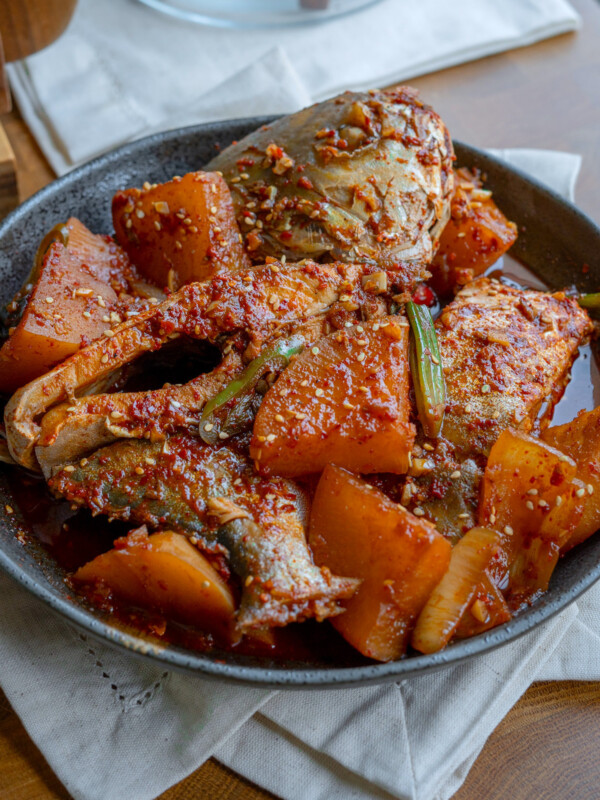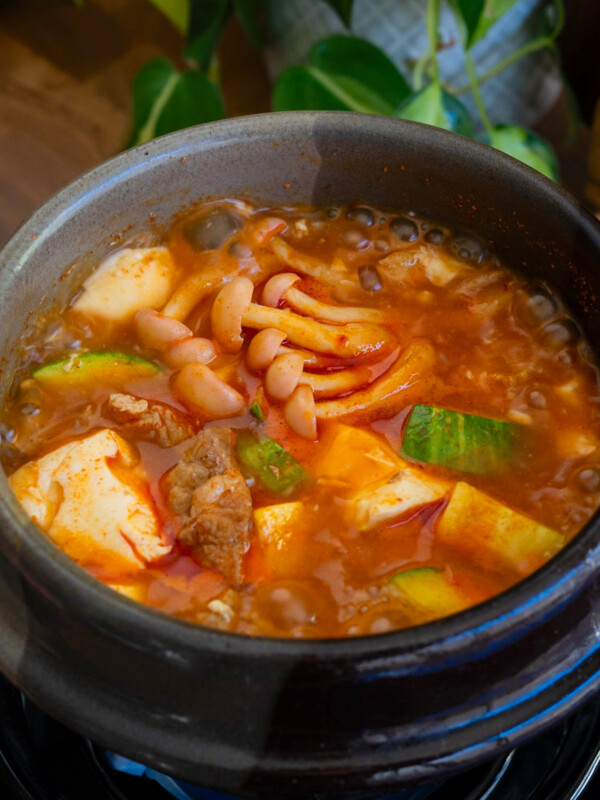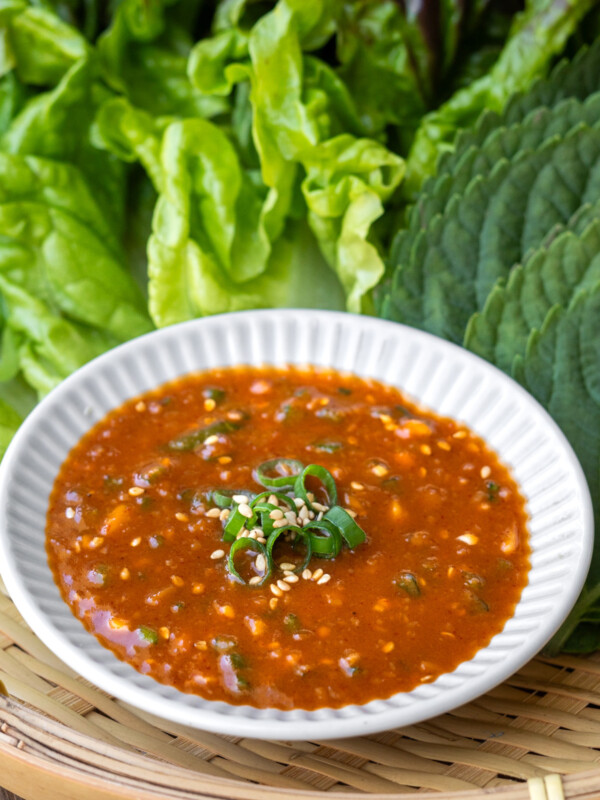This post may contain affiliate links. I only recommend products or services that I personally use or trust, promise!

It’s blueberry season! This blueberry cheong (syrup) is one of my favorite things to make with blueberries during this time. You can use it as a sweetener in desserts, savory dishes, salad dressings, and drinks- including cocktails!
This recipe is super simple only using a few ingredients, but it does take a little bit of time. Make a lot of it and you won’t have to make it again for months, as it will last in the fridge for a pretty long time.
What is Cheong?
Cheong is any type of syrup that is made by combining fruit or vegetables with equal weight in sugar, and letting it sit for up to 3 months depending on a few factors. The purpose is to extract as much flavor from the fruit or vegetable into the syrup.
This is exactly how plum syrup (maesil) is made, which is an ingredient I use in a lot of my cooking. Plum syrup takes about 3 months (or 100 days to be more traditional), but this blueberry syrup only takes about a week.

Ingredients:
You only need 3 ingredients to make blueberry cheong!
- Blueberries– this recipe is written for 1 lb of blueberries, but you can adjust this amount to your liking and even use other fruits. The conversion is easy- 1:1 ratio of fruit to sugar.
- Sugar- any sugar is fine. I prefer to use turbinado sugar for cheongs because it has a bit more depth in flavor, and it’s what is traditionally used.
- Baking soda- this is just for cleaning the blueberries. Soaking the blueberries in water with a little baking soda is great for cleaning them of any dirt and/or pesticides.

How to make blueberry cheong:
- Put the blueberries in a large bowl with cold water. If you don’t want any unripe (sour) blueberries in your cheong, pick out the ones that float. I like both sweet and sour blueberries, so I just leave them.

- Add 1 tbsp of baking soda, gently mix, then let it soak for about 15 minutes. This is to wash the blueberries of any pesticides and/or dirt.

- Rinse well then dry the blueberries either with a salad spinner or laying them out on paper towels.

There are two methods you can use-
- The fast way is to muddle the blueberries before adding the sugar. You don’t have to muddle every single blueberry into pulp, as you can see in the picture below, there are still a few whole blueberries.
- The more traditional way is to add the blueberries and sugar to the jar in layers. This will take a few weeks to start turning into syrup, and will have a slightly more concentrated flavor but honestly, it’s not that noticeable to me compared to the fast way.
*Note: make sure your jar is sanitized!

- After the blueberries have been muddled, add about 2/3 of the sugar and mix well.

- Pour in the remaining sugar on top, and evenly spread it to cover the blueberries. This is just an extra protective layer so mold doesn’t form. It’s going to dissolve eventually. Store in the cool dark spot for 1 week.

- After 1 week, strain the syrup. Push/squeeze as much syrup as you can through. You can use what’s remaining to make a blueberry soju so don’t throw it away. Put it back in the jar and fill it with soju for a few weeks. Or you can use it to make something else- I use it to make jam.

- Strain one more time into a sanitized glass jar or bottle. That’s it!

How to store & use blueberry cheong
Store in the refrigerator for up to 6 months. I prefer to store it in a bottle so that it can be easily poured out. A jar is fine too, but make sure you use a clean spoon to get the syrup. This should be obvious but do not lick your spoon and put it back in the jar.
You can use this blueberry syrup as a sweetener for anything! Obviously use it where it makes sense- you probably don’t want blueberry syrup in your galbi jjim marinade.
I’ve been using it a lot to sweeten my iced matcha lattes. Matcha + blueberry is an amazing pairing! It would also be great for cocktails, baking, salad dressing, and ice cream!
Pro tip: save the leftover pulp/seeds to make jam. One of my FAVORITE sweet indulgences is toasted milk bread with butter & jam. This leftover pulp is perfect for that!

To make the jam:
- Add 1 tbsp of fresh lemon juice to the blueberry pulp. Blend using an immersion blender until it is your desired consistency.
- Store in a sanitized jar and keep in the fridge for up to 2 months.

More syrup recipes
If you’re interested in other types of cheong, try my apple-lemon cheong! It’s probably my favorite cheong ever. My mom asks me to make her a big batch every couple of months. It’s especially delicious in drinks!

Blueberry Cheong
Ingredients
- 1 lb blueberries
- 1 lb sugar
- 1 tbsp baking soda, for rinsing
Instructions
- Put the blueberries in a large bowl with cold water. If you don't want any unripe (sour) blueberries in your cheong, pick out the ones that float. I like both sweet and sour blueberries, so I just leave them.

- Add 1 tbsp of baking soda, gently mix, then let it soak for about 15 minutes. This is to wash the blueberries of any pesticides and/or dirt.

- Rinse well then dry the blueberries either with a salad spinner or laying them out on paper towels.

- There are two methods you can use here- the fast way is to muddle the blueberries before adding the sugar. You don't have to muddle every single blueberry into pulp, as you can see in this picture there are still a few whole blueberries. The more traditional way is to add the blueberries and sugar to the jar in layers. This will take a few weeks to start turning into syrup, and will have a slightly more concentrated flavor but honestly, it's not that noticeable to me compared to the fast way.*Note: make sure your jar is sanitized!

- After the blueberries have been muddled, add about 2/3 of the sugar and mix well.

- Pour in the remaining sugar on top, and evenly spread it to cover the blueberries. This is just an extra protective layer so mold doesn't form. It's going to completely dissolve eventually. Store in the cool dark spot for 1 week.If it's warm in your house, I recommend putting this in the refrigerator to prevent any fermentation from happening.

- After 1 week, strain the syrup. Push/squeeze as much syrup as you can through. You can use what's remaining to make a blueberry soju so don't throw it away. Put it back in the jar and fill it with soju for a few weeks. Or you can use it to make something else, like jam.

- Strain one more time into a sanitized glass jar or bottle.

- Store in the refrigerator for up to 6 months.

Nutrition information is automatically calculated, so should only be used as an approximation.















So yum!! I’ve been adding to my matcha lattes and I’m so scared to run out – I’ll have to start another batch soon.
I also saved some of the left over blueberries to make blueberry, white chocolate chip oatmeal cookies and they were a hit!!
I followed this recipe awhile ago and the cheong came out great! although blueberry flavor is not particularly strong I’m excited to try the recipe with other fruits.
My wife’s favorite recipe so far. It’s the best after a day of blueberry picking in peak season. Thanks for all your hard work.
I absolutely am in love with this cheong!! It’s a nice vibrant flavor and I love adding it to my seltzer water and to my haagen daz vanilla bean ice cream!! I can’t wait to try the apple lemon that’s also fermenting right now.
This was so good with my daily iced matcha. Such a beautiful color.
So good and easy to make! This is actually the recipe & ig post that drew me to you in the first place!
This was so good and easy to make!
This is the first recipe I tried from you! It was amazing, such a simple recipe and really hits your sugary soda cravings. We tried this during the summer and it was a hit among my family. We killed it in 2 days. Thanks!
Tried this recipe with cherries since we couldn’t finish them and loved how it turned out. Will definitely try with blueberries next time.
Okay I finally made it, well I made it awhile ago but it’s finally finished! It turned out beautiful— but now what do I do? Are there any specific recipes? Is there a specific dessert I can make with it?